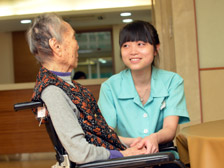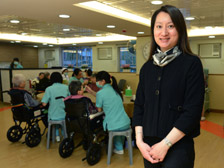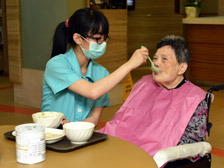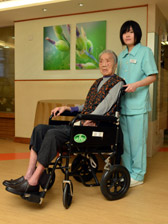
Able and willing:
Abby proved her ability to take care of seniors through her actions, enabling their relatives to relax and feel confident that she was up to the task.
Able and willing:
Abby proved her ability to take care of seniors through her actions, enabling their relatives to relax and feel confident that she was up to the task.

Family feel:
Nursing home superintendent Grace Cheng, Abby’s employer, says the seniors get along well with the young caregivers, and treat them like grandchildren.
Family feel:
Nursing home superintendent Grace Cheng, Abby’s employer, says the seniors get along well with the young caregivers, and treat them like grandchildren.

Ready to serve:
Training programme participants learned first aid and basic care skills before taking up their posts.
Ready to serve:
Training programme participants learned first aid and basic care skills before taking up their posts.

Mutual benefits:
The scheme provides the younger generation with employment options while helping to cope with the increasing demand for care personnel in elderly services.
Mutual benefits:
The scheme provides the younger generation with employment options while helping to cope with the increasing demand for care personnel in elderly services.
Training scheme benefits young and old
April 13, 2014
With the goal of becoming a registered nurse, 18-year-old Abby Poon joined a novel training programme last September that allows her to earn as she learns. She takes care of seniors in a nursing home – a job she had not previously considered - while studying towards a diploma in health.
The Youth Career Navigation Scheme in Elderly Services pilot scheme encourages youths from 17 to 24 to join seniors services organisations, to help meet the rising demand for care personnel due to Hong Kong’s aging population.
The experience can be eye-opening. Abby wakes up at five in the morning to arrive at the Oasis Nursing Home in Tsz Wan Shan before seven o’clock.
“My mom used to be the one to wake me up and take care of me. Now I’m the one who wakes the seniors and takes care of them. I help feed them, and serve their daily needs like giving them a bath or trimming their nails.”
The first time she was asked to change a senior’s diaper, she was a bit taken aback, thinking it was a dirty task that she could not bring herself to do. She quickly overcame her uneasiness, though, and had adapted within a week.
Now, Abby knows well the habits and personal preferences of individual seniors. One woman likes to use hot water to wash her face every morning. Another needs a stool to support her legs when resting in the common room.
She enjoys chatting with her charges, even though they may not always be willing or able to speak up themselves. By holding their hands, she believes they can feel her love and care.
Gaining trust
With her young age and lack of experience, the seniors’ relatives questioned Abby about her ability to care for their loved ones. Within months, she had proved her prowess through her actions, enabling the relatives to relax and feel confident that she was up to the task.
“Once I was assigned to work on another floor, to serve another group of seniors. A family member asked me not to leave and hoped that I could stay and continue to take good care of her relative. I was so happy to receive this recognition, because it was not easy to gain their trust when I first arrived,” she said.
Abby’s employer, nursing home superintendent Grace Cheng, said some relatives initially misunderstood that she had hired trainees. She clarified that the care workers like Abby were participants in a training programme who had already completed an orientation programme, first aid training and basic care training before she hired them.
Ms Cheng is satisfied with Abby’s performance, and that of other programme participants working in her nursing home. She sees them as eager to learn and improving day by day.
“The youth bring vitality to the nursing home. The seniors like them and treat them like their grandchildren,” she said.
Ms Cheng has enrolled seven participants from the scheme. As an employer, she feels the programme’s greatest advantage is that care homes like hers can employ the young personal care workers for a total of three years, providing a solution to the shortage of personal care workers in the field.
“Through those three years of work, we have time to teach them, and also have them develop a sense of belonging. I hope they will stay on and work here in the future.”
Learn as you earn
The Youth Career Navigation Scheme in Elderly Services has so far attracted 170 young people. The Government initiated the “first-hire-then-train” pilot scheme through the Lotteries Fund last September, run by the Yuen Yuen Institute, a non-government organisation. It recruited secondary school graduates aged 17 to 24 who were willing to work with seniors.
Each participant is assigned to work in an elderly home for 44 hours a week, with a monthly salary of $9,100. The pay increases to more than $10,000 in the second year, when the participant is promoted to a health worker. In the first two years, they also study part-time through the Open University of Hong Kong to obtain a diploma in health studies.
They will continue to work full time in the elderly home during the third year. When they complete the three-year programme, they will have credentials and work experience, and can receive a refund of a total of about $60,000 for their course fee. They can then apply for further studies which could put them on a path to becoming an enrolled nurse or degree holder.
Yuen Yuen Institute Vice Chairman Henry Tong said the scheme provides the younger generation with employment options while helping to cope with the increasing demand for care personnel in elderly services.
“Most young people lack working experience. The participants of this scheme can get a full-time job for a period of three years, also a chance to equip themselves with the required skills, allowing them to start to climb the professional ladder,” Mr Tong said.
Since the pilot scheme has been so warmly embraced, the Government has earmarked $147 million in additional funding to expand it to cover rehabilitation services and provide another 1,000 places in the coming few years.